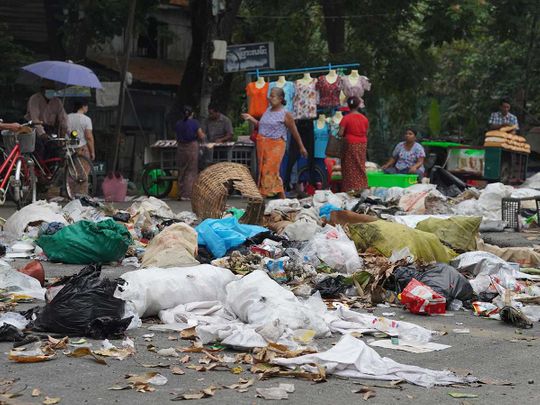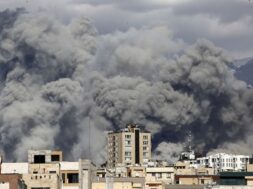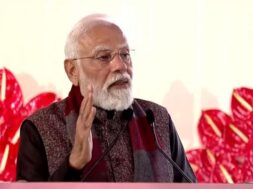
Virendra Pandit
New Delhi: ‘Leave your garbage on the roads’, goes the slogan. In a unique form of civil disobedience movement in Myanmar, where more than 500 people have died in the military junta’s brutal crackdown in the last two months, pro-democracy activists are replying to bullets with accumulating garbage.
Recently, some of the injured activists had crossed over into the bordering states of Mizoram and Manipur in north-eastern India where they were being treated in hospitals, reports said.
With municipal workers also joining the popular uprising against the military junta, visuals of piles of garbage in towns and cities trended on social media. The pro-democracy activists appealed to the people to leave their garbage unattended on the roads. Photos of garbage covering main road intersections and streets of Yangon were used as a new form of spreading protest as activists posted them on social media.
According to local media, it annoyed the rulers and military authorities warned that they would take action against those who threw out garbage in Kyeemyindaing district, western Yangon.
Ever since the Myanmar army overthrew a democratically-elected government on February 1, the south-east Asian country has been plagued with countrywide unrest due to the pro-democracy activists staging demonstrations across the nation on a daily basis, and the military trying to crush them.
The death of over 500 people in two months has only intensified their resolve against the junta. Even funerals have become scenes of resistance and violence, media reports said.
Resistance watchdog Assistance Association for Political Prisoners (AAPP) confirmed the toll and warned that it could actually be higher. On Monday also, at least 14 people were killed in the country, including eight in Myanmar’s biggest city Yangon.
International outrage has also escalated and pressure is mounting on Myanmar’s junta for using brute force against protesters since the military ousted the elected leader Aung San Suu Kyi and her associates on February 1.
On Monday, the United States suspended a trade deal with Myanmar, demanding the restoration of a democratic government. President Joe Biden denounced the crackdown on civilians as “absolutely outrageous”
The US, Canada, Britain, and the European Union had imposed sanctions on Myanmar’s military generals. International organizations, including the United Nations, have continuously condemned the crackdown.
Earlier in March, Myanmar’s junta had imposed martial law in two districts in Yangon to gain more power amid increasing protests in the city.
Apart from the civil disobedience movement, the army is facing heat even from armed ethnic groups. Three of Myanmar’s armed ethnic rebel groups issued a joint statement threatening the military with retaliation.
The Ta’ang National Liberation Army, the Myanmar Nationalities Democratic Alliance Army, and the Arakan Army (AA) said if the junta did not stop the bloodshed, they would “cooperate with the protesters and fight back.”
The statement came after the General Strike Committee of Nationalities (GSCN), one of the leading groups organizing demonstrations, called for ethnic minority forces to help protesters.
Since Myanmar’s independence from Britain in 1948, armed rebel groups have fought the central government for decades for more autonomy.
















